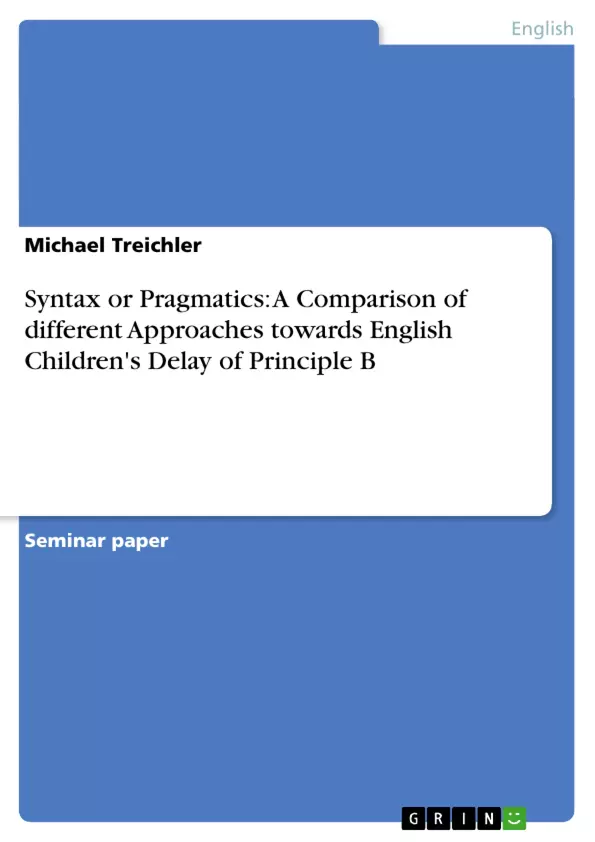In their experiment carried out in order to test children’s knowledge of the binding principles, Chien and Wexler (1990) observed that their subjects showed a considerable delay of the acquisition of Principle B compared with Principle A. While the children who participated in their study mastered the locality conditions of anaphors nearly perfectly by the age of six and even earlier, many of them still allowed pronouns to be coindexed with a local antecedent.
In a similar study especially designed to examine children’s knowledge of only Principles B and C, Grimshaw and Rosen (1990) also found that the non-locality constraint for pronouns was to a large extent violated. Like Chien and Wexler, Grimshaw and Rosen state that children yet have innate knowledge of Principle B. A distinction has to be made, they argue, between knowledge of Principle B, on the one hand, and obedience to it on the other. Although children know Principle B, other grammatical and pragmatic influences and circumstances prevent them from obeying it.
Both theses have in common that they are based on the assumption that the delay of Principle B is a universal phenomenon that can be found throughout all languages. However, in a study carried out by McKee (1992), it turned out that the delay of Principle B only affected the group of English children while the Italian children showed nearly perfect mastery of both Principle A and B. McKee accompanies these results by her proposal for an explanation of English children’s delay of Principle B. Since the experiment was carried out with Italian sentences containing clitic pronouns, her account is based on syntactical differences between this type of sentences and its English counterparts containing full pronouns.
This paper will start with a presentation of McKee’s thesis. The presentation will be followed by a discussion in which McKee’s account will be compared with alternative explanations for the delay of Principle B. Since McKee’s syntactically motivated model stand in contrast to other theses based on pragmatics, the final aim will be a judgment about the adequacy and plausibility of both types of approaches. This judgment will be supported by another thesis developed by Cardinaletti and Starke (1995) in which they seek to explain the delay of Principle B by an ambiguity of English pronouns comprising all parts of grammar.
Inhaltsverzeichnis (Table of Contents)
- Introduction
- McKee's account of English children's delay of Principle B
- Other approaches towards an explanation of the delay of Principle B
- Pragmatic constraints
- Knowledge and Obedience
- Ambiguity of pronouns
- Discussion
- McKee and Chien and Wexler
- McKee and Grimshaw and Rosen
- McKee and Cardinaletti and Starke
- Strong pronouns and emphatic pronouns
- Different GCs for pronouns and anaphors
- Conclusion
Zielsetzung und Themenschwerpunkte (Objectives and Key Themes)
This paper aims to compare different approaches to explaining the delay in English-speaking children's acquisition of Principle B in Binding Theory. The author examines McKee's syntactic explanation of the delay, contrasting it with alternative pragmatic accounts.
- The delay of Principle B in English-speaking children.
- McKee's syntactic explanation of the delay.
- Alternative pragmatic explanations for the delay.
- The role of clitic pronouns in Italian.
- The definition of governing category (GC) and its implications for pronoun binding.
Zusammenfassung der Kapitel (Chapter Summaries)
- Introduction: This chapter introduces the phenomenon of the delay of Principle B in English-speaking children, citing research by Chien and Wexler and Grimshaw and Rosen. It highlights the contrasting findings of McKee's study, which showed no such delay in Italian-speaking children. The chapter establishes the paper's focus on comparing McKee's syntactic account with alternative pragmatic explanations for the delay.
- McKee's account of English children's delay of Principle B: This chapter presents McKee's experiment and findings, demonstrating the significant difference in performance between English and Italian children on pronoun binding tasks. It introduces McKee's proposed explanation based on the syntactic differences between English full pronouns and Italian clitic pronouns, particularly in terms of governing category (GC) definition.
- Other approaches towards an explanation of the delay of Principle B: This chapter explores alternative explanations for the delay of Principle B, focusing on pragmatic constraints, knowledge and obedience, and the ambiguity of pronouns. It examines various theories and their arguments for the delay being a result of factors other than syntax.
Schlüsselwörter (Keywords)
The primary focus of this paper is on Binding Theory, particularly the delay of Principle B in English-speaking children. Key concepts include syntax, pragmatics, governing category (GC), clitic pronouns, full pronouns, and the acquisition of grammatical principles.
Frequently Asked Questions
What is the "Delay of Principle B" in language acquisition?
It refers to the observation that children often take longer to master the rules for pronouns (Principle B) compared to anaphors (Principle A), sometimes allowing pronouns to refer to local antecedents when they shouldn't.
Is the Principle B delay a universal phenomenon?
While some researchers thought so, studies (like McKee 1992) found that Italian children master Principle B earlier than English-speaking children, suggesting language-specific factors are at play.
How does McKee explain the difference between English and Italian children?
McKee proposes a syntactic explanation based on the differences between English full pronouns and Italian clitic pronouns, particularly regarding how their "governing categories" are defined.
What are the pragmatic approaches to this delay?
Pragmatic theories suggest that children actually have innate knowledge of Principle B but fail to obey it due to other grammatical influences, context, or an inability to process complex pragmatic constraints.
What is the "Ambiguity of Pronouns" thesis?
Developed by Cardinaletti and Starke, this thesis suggests that English pronouns are ambiguous across different parts of grammar, which complicates the acquisition process for children.
- Quote paper
- Michael Treichler (Author), 2004, Syntax or Pragmatics: A Comparison of different Approaches towards English Children's Delay of Principle B, Munich, GRIN Verlag, https://www.grin.com/document/31595



